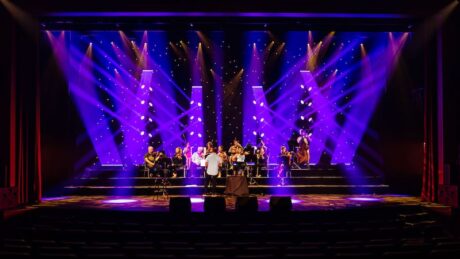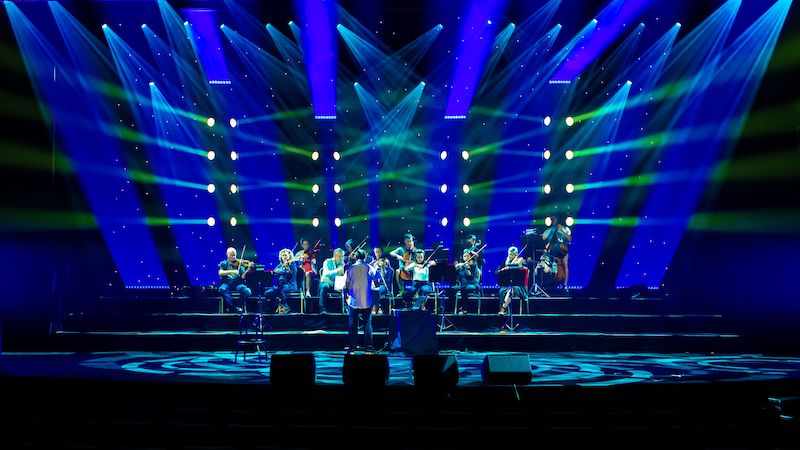
Few things in life are “all one way,” believes Gil Perron. Usually, one must take the pros with the cons. So, while lighting a musical performance in an actual theatre with a fly system has its advantages, it also brings some distinct challenges with it. Perron experienced both first hand in early July when he lit a special, private show by the award-winning Italian trio Il Volo at Montreal’s Teatro Leonardo DaVinci. Although rigging was a lot easier at this facility, the design team had to be much more mindful of load capacity.
This was “sort of a big deal” for Perron, given his penchant for grouping fixtures in clusters to create unique multi-directional light angles. “It’s kind of my thing; I like clumping fixtures in groups of three and then layering them vertically and horizontally,” he said. “This is tougher on a fly system than on truss, but it’s well worth the effort. Doing this, I can use color theory to create either triadic or analogic color complementariness.”

“Working with another proponent of color theory, our Programmer/Operator Guy Laflamme made this a lot of fun—you pick the primary and then, as if by ‘magic,’ the complementariness appears,” continued Perron. “Guy is an established LD in his own right and he deserves a lot of credit in bringing so many stunning ‘images’ to the show. He completely understood my mind’s eye and I just let him run with it!”
Helping Perron and Laflamme work this magic, while also reducing the load demand on the fly system, thanks to their efficient design, was a collection of more than 100 Chauvet Professional fixtures supplied by LSM Ambiocreateurs’ Montreal office.

“This was a one-off, so I was handed a global budget that included scenery and lighting,” said Perron. “We did a very simple gala-type riser set-up and used a star drape in the back to create depth. The orchestra was positioned on the levels while the singers occupied a large unobstructed area. We relied on lighting to be a visual element, in addition to serving as a source of illumination.”
Directing light from Maverick and Rogue fixtures through the tiered orchestra section, Perron animated the musicians with a vibrant interplay of colors as they performed, engendering a sense that this was a special occasion. He also relied on the Maverick Force 1 Spot to create captivating moving gobo patterns on the stage that seemed to flow with the music.
“This was my first time using the Force 1, and while I had seen the beta and the gobo package on paper, doing the thing live was a lot of fun,” he said. “To me this package is a big wow. Especially the “I“ gobo… double wow. So, we used these lights quite extensively and layered their output with the prisms and the effects wheel. The light has sufficient output to use so much stuff and saturated colors and still have impact.”

Perron positioned six of the Maverick Force 1 Spot fixtures, corrected to 4600k on the secondary FOH, and used them to light the orchestra. Another 30 units of the fixture were hung on four different electricals and relied on for texture and general lighting.
A collection of 32 Rogue Outcast 1 BeamWashes was positioned on custom welded ladders with a mix of COLORado PXL Bars (8 and 16 models) on the top of these structures, as well as on the deck, from where they were used to direct hard blades of light between the set and the audience, enhancing the sense of depth on stage.

From their position on the ladders, the Rogue Outcast 1 BeamWashes served as beams as well as eye candy with their halo feature. “The performance of this fixture was even better than anticipated,” said Perron. The actual smoothness of the beam compared to a classic “beam” light is stunning and obviously very much aligned with this type of performance. I can see this device being in so many applications now.”
Along with the performance of his fixtures, Perron credits his crew with making this project turn out so splendidly. In addition to Laflamme, this group included TD Eden Ashby, master electrician Pascal Lucas, and LSM account executive Archie Cifellie.
“Regardless of the project, in the end it always comes down to success depending on good people,” declared Perron. That’s one statement he can make unequivocally, no pro or con about it, people, he says, “always make the difference.”


